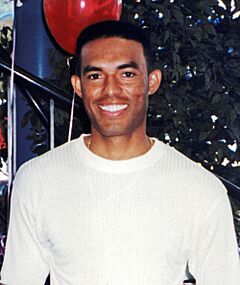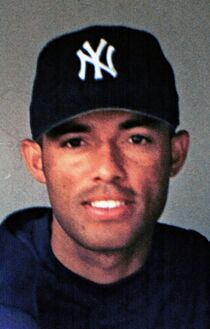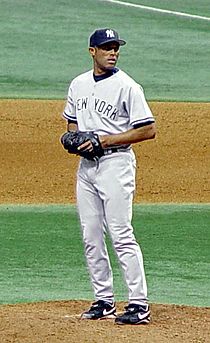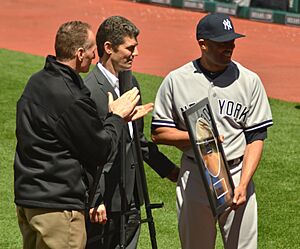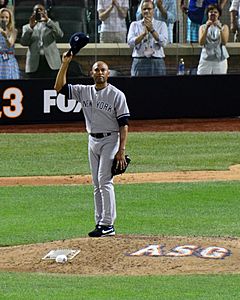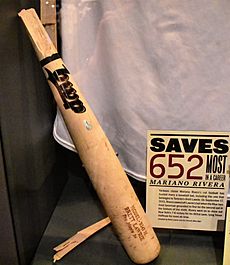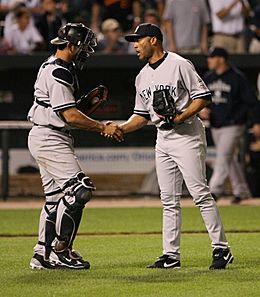Mariano Rivera facts for kids
Quick facts for kids Mariano Rivera |
|||
|---|---|---|---|
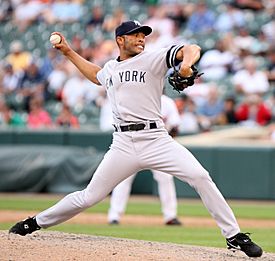
Rivera with the New York Yankees in 2007
|
|||
| Relief pitcher | |||
| Born: November 29, 1969 Panama City, Panama |
|||
|
|||
| debut | |||
| May 23, 1995, for the New York Yankees | |||
| Last appearance | |||
| September 26, 2013, for the New York Yankees | |||
| MLB statistics | |||
| Win–loss record | 82–60 | ||
| Earned run average | 2.21 | ||
| Strikeouts | 1,173 | ||
| Saves | 652 | ||
| WHIP | 1.00 | ||
| Teams | |||
|
|||
| Career highlights and awards | |||
|
|||
| Induction | 2019 | ||
| Vote | 100% (first ballot) | ||
Mariano Rivera (born November 29, 1969) is a Panamanian-American former professional baseball pitcher. He played 19 seasons in Major League Baseball (MLB) for the New York Yankees, from 1995 to 2013. His nicknames were "Mo" and "Sandman." For most of his career, he was a relief pitcher, and for 17 seasons, he was the Yankees' closer, the pitcher who finishes the game.
Rivera was a thirteen-time All-Star and a five-time World Series champion. He holds the MLB record for the most career saves with 652. A save is when a relief pitcher finishes a game for the winning team under certain conditions. In 2019, he was elected to the Baseball Hall of Fame. He was the first player ever to be elected unanimously, meaning every single person who could vote for him did.
Rivera grew up in a small fishing village in Panama. He was signed by the Yankees in 1990 and started in the major leagues in 1995. He became the Yankees' closer in 1997 and soon became one of the best relief pitchers in baseball. He was famous for his "cut fastball," a pitch that was very hard for batters to hit and often broke their bats.
He was a key player for the Yankees when they won four championships in five years in the late 1990s and early 2000s. He was also amazing in the postseason, setting records for the lowest earned run average (ERA) and the most saves. Many people consider him the greatest relief pitcher in baseball history.
Contents
Early Life
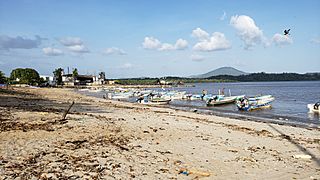
Mariano Rivera was born in Panama City, Panama. His family lived in the poor fishing village of Puerto Caimito. His father was the captain of a fishing boat. As a boy, Rivera loved to play soccer and baseball with his friends on the beach.
For baseball, they used cardboard milk cartons for gloves and tree branches for bats. They made balls by taping together shredded fishing nets. When he was 12, his father bought him his first real leather glove.
Rivera dropped out of school in the ninth grade. At 16, he started working on his father's fishing boat. He called the job "extremely hard." After his uncle died in a boating accident and his father's boat nearly sank, Rivera decided fishing was not the career for him.
He stopped playing soccer after some injuries and focused on baseball. He joined a local amateur team. At first, he played different positions. But one day, his team's pitcher was doing so badly that Rivera was asked to pitch. He had no experience, but he pitched very well. A scout for the New York Yankees heard about him and invited him to a tryout. The scout was impressed by his smooth pitching motion and signed him to a contract in 1990.
Professional Baseball Career
Minor Leagues (1990–1995)
After signing with the Yankees, Rivera moved to the United States. He didn't speak any English and was very homesick. He started playing for a Rookie level team, the GCL Yankees. He had a great first season, proving he had talent.
Over the next few years, he moved up through the Yankees' minor league system. In 1992, he had surgery on his pitching elbow. This was a serious injury, but it was not the famous Tommy John surgery. He recovered and continued to improve.
By 1994, he was pitching for the Triple-A Columbus Clippers, the highest level of the minor leagues. At the start of the 1995 season, Baseball America magazine ranked him as the ninth-best young player in the Yankees organization.
Major Leagues (1995–2013)
1995–1997: Becoming a Star
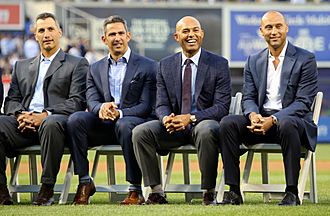
Rivera made his major league debut on May 23, 1995. At first, he struggled as a starting pitcher. But during his time back in the minor leagues, something amazing happened. His pitching speed suddenly increased by about 6 miles per hour. The Yankees realized he was too valuable to trade.
He returned to the major leagues and was moved to the bullpen as a relief pitcher. In 1996, he was a "setup man," pitching in the 7th and 8th innings before the closer, John Wetteland. Rivera was fantastic. He helped the Yankees win the 1996 World Series, their first championship in 18 years.
In 1997, the Yankees made Rivera their new closer. That summer, he accidentally discovered how to throw his famous cut fastball. This pitch would become his signature. He finished the season with 43 saves and was named an All-Star.
1998–2001: A Yankees Dynasty
From 1998 to 2001, Rivera was a key part of a Yankees team that was a true dynasty. His cutter was famous for breaking batters' bats. He helped the Yankees win the 1998 World Series, the 1999 World Series, and the 2000 World Series.
In 1999, he won the World Series MVP Award. This was also the year the Yankees started playing the song "Enter Sandman" when he came into the game. The song became his trademark.
By 2001, Rivera was one of the most dominant closers in baseball. He led the league with 50 saves. However, in the 2001 World Series, he had a rare failure. He couldn't get the final outs in Game 7, and the Yankees lost to the Arizona Diamondbacks. It was a tough moment, but it was the only time he ever lost a postseason game in his entire career.
2002–2008: Records and Resilience
Rivera continued to be one of the best closers in baseball. In 2002, he became the Yankees' all-time leader in saves. In 2003, he had an amazing performance in the AL Championship Series against the rival Boston Red Sox. He pitched three scoreless innings in the deciding Game 7, which the Yankees won.
In 2004, he set a career-high with 53 saves. But in the playoffs that year, he blew two saves against the Red Sox, who came back to win the series. Fans at Yankee Stadium even booed him, but he bounced back. The next season, he had one of his best years ever, with a tiny 1.38 ERA.
By 2008, Rivera was still going strong. He had an incredible season with a 1.40 ERA and 39 saves. On September 21, 2008, he threw the very last pitch in the history of the original Yankee Stadium.
2009–2013: Final Championships and Farewell
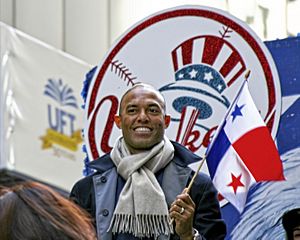
In 2009, Rivera helped the Yankees win another World Series, his fifth and final championship. On September 19, 2011, he recorded his 602nd career save, breaking the all-time MLB record.
In 2012, his season was cut short by a serious knee injury. Some thought his career might be over. But Rivera promised he would return, saying, "I'm not going down like this."
He returned for one final season in 2013. He announced it would be his last. All year long, teams around the league honored him with special gifts. The Minnesota Twins gave him a rocking chair made of broken bats, called the "Chair of Broken Dreams."
He was named an All-Star for the 13th time and was the MVP of the All-Star Game. On September 22, 2013, the Yankees retired his uniform number 42 and held a special ceremony for him.
His final game at Yankee Stadium was on September 26, 2013. In a touching moment, his longtime teammates Andy Pettitte and Derek Jeter came to the mound to take him out of the game. The entire stadium gave him a long standing ovation as he walked off the field for the last time.
Player Profile
Pitching Style
Rivera's most famous pitch was the cut fastball, or "cutter." It looked like a normal fastball but would suddenly move sideways just as it reached the batter. This late movement made it incredibly difficult to hit squarely. Hitters often made weak contact or broke their bats.
He said he didn't invent the pitch on purpose. One day in 1997, his fastballs just started moving that way. He said, "It was just from God." He learned to control it, and it became the most dominant pitch in baseball for many years.
Rivera also had amazing control. He could throw the ball exactly where he wanted it. This was because of his smooth, simple pitching motion. Even though hitters knew the cutter was coming, they still couldn't hit it.
Personality
On the field, Rivera was known for being very calm and reserved. He never got too emotional, even in high-pressure situations. Hall of Fame pitcher Goose Gossage said it seemed like Rivera had "ice water in his veins."
Rivera was also a respected leader in the Yankees clubhouse. He often mentored younger players and was known for his team-first attitude. He was humble and always gave credit to his teammates for his success.
Legacy
Mariano Rivera is widely considered the greatest relief pitcher in the history of baseball. He holds the all-time records for most saves (652) and games finished (952). His career ERA of 2.21 is one of the lowest ever for a pitcher with so many innings.
He was even better in the postseason. He holds records for the most postseason saves (42) and the lowest postseason ERA (0.70). An often-repeated fact is that more people have walked on the Moon (12) than scored an earned run against Rivera in the playoffs (11).
In 2019, he became the first player ever to be elected to the Baseball Hall of Fame with 100% of the vote. He was the last player in MLB to wear the number 42, which was retired for all teams in 1997 to honor Jackie Robinson. Rivera wore it with pride and was seen as a great representative of Robinson's legacy.
Personal Life
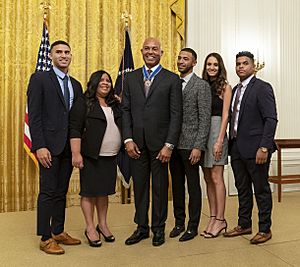
Rivera married his wife, Clara, in 1991. They have known each other since elementary school. They have three sons: Mariano III, Jafet, and Jaziel. His oldest son, Mariano III, was also a baseball pitcher and was drafted by the Washington Nationals.
Rivera is a devout Christian. He and his family are involved in many charitable causes through the Mariano Rivera Foundation. The foundation helps underprivileged children in the United States and Panama. After retiring, he opened a church in New Rochelle, New York, where his wife Clara is the pastor.
In 2019, President Donald Trump awarded Rivera the Presidential Medal of Freedom. This is the highest honor a civilian can receive in the United States.
See also
 In Spanish: Mariano Rivera para niños
In Spanish: Mariano Rivera para niños
 | Tommie Smith |
 | Simone Manuel |
 | Shani Davis |
 | Simone Biles |
 | Alice Coachman |


